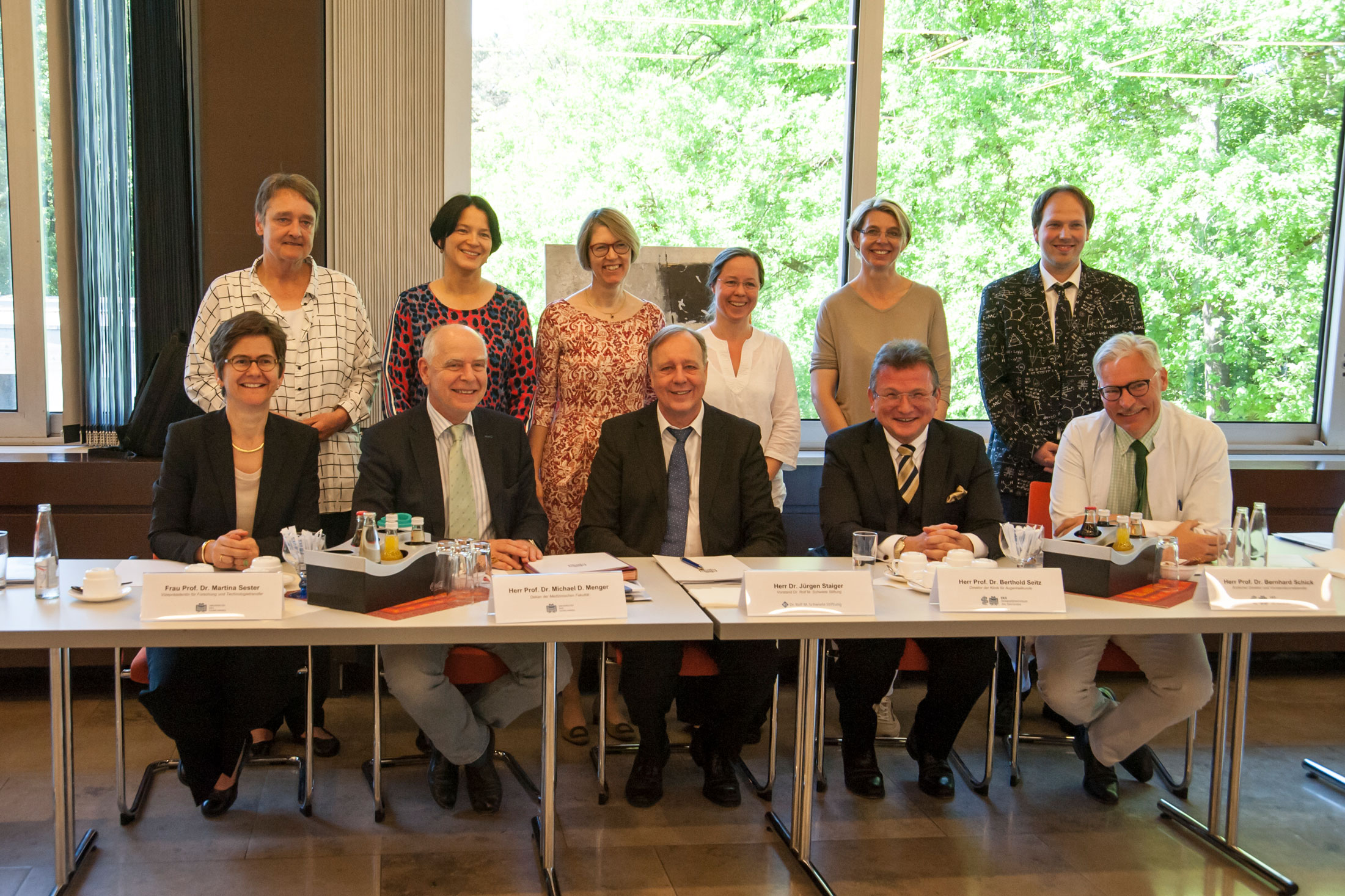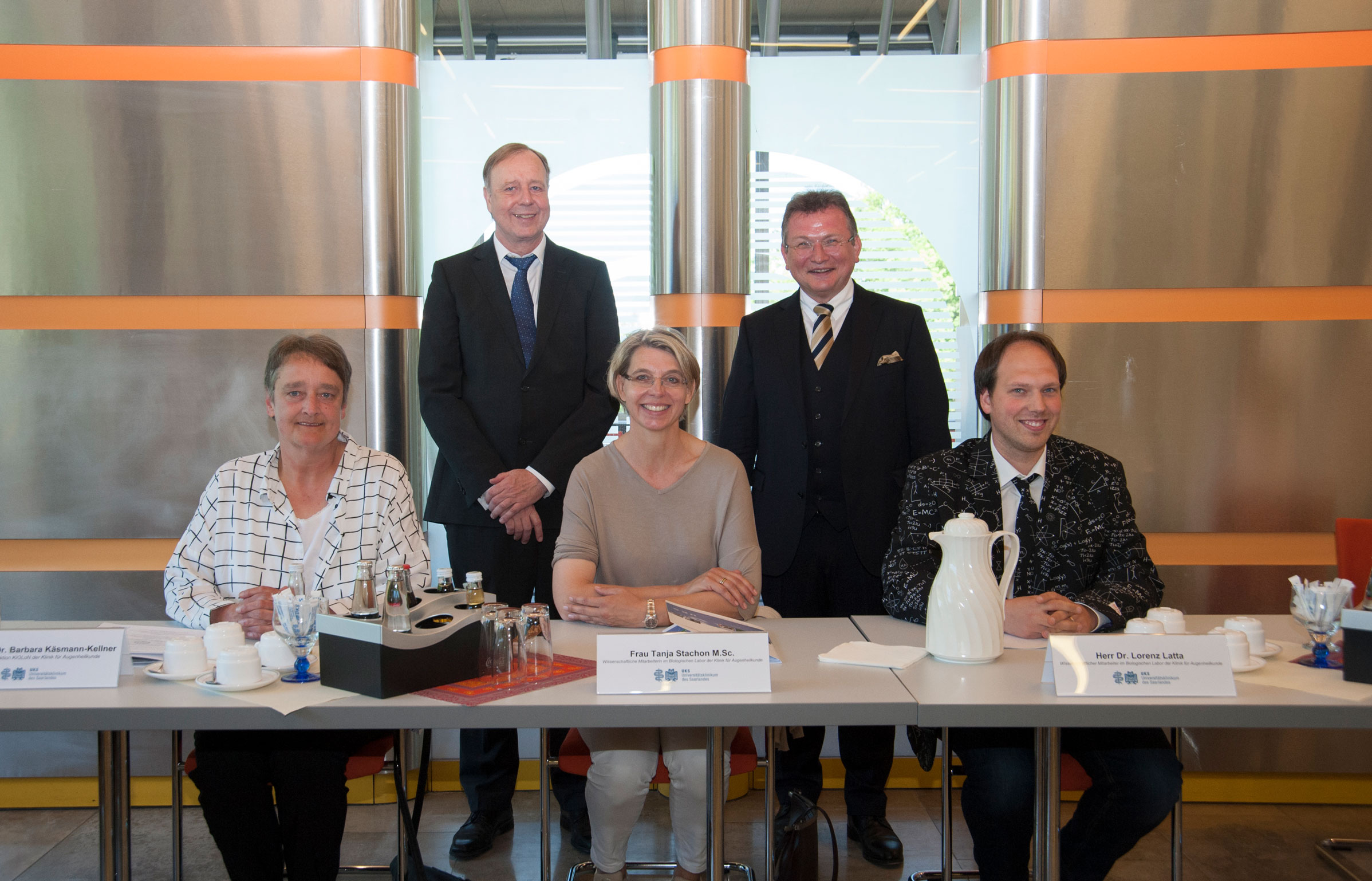Dr. Jürgen Staiger, Chairman of the Board of the Mannheim-based Schwiete Foundation, explained that two focal points were decisive for the application submitted by the University Eye Clinic under the direction of Professor Dr. Berthold Seitz: "Firstly, there was the approach of preserving people's eyesight with the help of limbal stem cell research. And there was the second focus, namely to prevent the consequences of a rare disease."

Prof. Dr. Martina Sester, Vice President for Research and Technology Transfer of Saarland University UdS, Prof. Dr. Michael D. Menger, Dean of the Medical Faculty of UdS and Member of the Board of Saarland University Hospital, Dr. Jürgen Staiger, Member of the Board of the Dr. Rolf M. Schwiete Foundation, Prof. Dr. Berthold Seitz, Head of Saarland University Eye Hospital, Prof. Dr. Bernhard Schick, Medical Director. Back row from left: Ophthalmologist Prof. Dr. Barbara Käsmann-Kellner, Dr. Anette Groh, Head of the Department of Science, Universities and Technology Transfer of the State Chancellery of Saarland, the two lawyers Ulrike Freidinger, Faculty Managing Director of the Medical Faculty of the UdS and Univ. Director Alexandra Hemprich from the Legal Department of the UdS as well as the two scientists from the Biological Laboratory, Tanja Stachon and Dr. Lorenz Latta.

Standing from left: Dr. Jürgen Staiger, Prof. Dr. Berthold Seitz
Seated from left: Prof. Dr. Barbara Käsmann-Kellner, Ms. Tanja Stachon, Dr. Lorenz Latta
About the planned Dr. Rolf M. Schwiete Endowed Professorship
The scientific focus of the Dr. Rolf M. Schwiete Endowed Professorship is limbal stem cell research and the clinical picture of congenital aniridia. These so-called limbal stem cells ensure that the cornea repeatedly regenerates itself and thus remains translucent. If these stem cells are destroyed - by an accident, a burn or other injuries - the cornea can no longer regenerate and becomes cloudy leading the affected person to go blind. Transplantation of limbal stem cells can then help to preserve the cornea or create the conditions for a corneal transplant. Within the framework of the endowed professorship, the processes at the molecular level by which the limbal stem cells are damaged are to be better understood and new therapeutic approaches researched. This includes the analysis and development of existing and new therapeutic approaches and their mechanisms of action. There are still quite a few gaps in the understanding of the physiology and molecular biology of conjunctiva and corneal epithelium and the differentiation processes of limbal stem cells. The aim is to establish cell models and test platforms on which individual processes and signaling pathways can be studied. In this context, a group of patients with a PAX6 gene defect plays an important role.
Congenital aniridia** is a rare congenital disorder in which children are born without the iris. The absence of the iris can be easily observed: the eye has no eye color. Usually, aniridia occurs in both eyes and leads to multiple health problems. In addition to the limitations in vision due to macular hypoplasia, optic dysplasia, cataract, glaucoma so-called aniridia-associated keratopathy, which can lead to blindness, aniridia is often accompanied by concomitant diseases. For example, diabetes, mental retardation, or malignant kidney tumors - so-called Wilms tumors - can be associated with aniridia. The endowed professorship intends to establish a German aniridia registry, to ensure standardized recording of the anatomical, morphological and molecular changes in congenital aniridia. In researching the pathophysiology of aniridia-associated keratopathy, the transferability of the results to other diseases with limbal stem cell insufficiency, such as after chemical burns or burns, is expected.
About the Dr. Rolf M. Schwiete Foundation
The Dr. Rolf M. Schwiete Foundation is a non-profit foundation based in Mannheim. It was established by Dr. Rolf M. Schwiete upon his death in 2013 and recognized as a foundation with legal capacity in 2014. Dr. Rolf M. Schwiete had managed the Van Baerle group of companies since 1964. The family business acquired by his father, Dr. Friedrich A. Schwiete, and managed before his son, manufactured water glass, paints, and detergents and cleaning agents. It was from this group of companies that the foundation of Dr. Schwiete's assets were laid. The income from the foundation's assets is used to support the following areas in particular:
- research, especially in the fields of medicine and chemistry
- the scientific education and further training of talented young people of suitable character
- national and international education for peace, freedom and justice
- the arts and culture